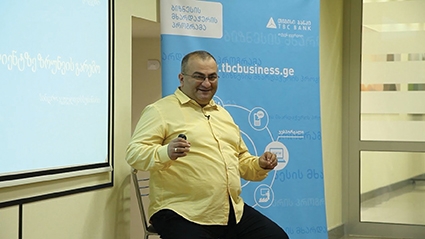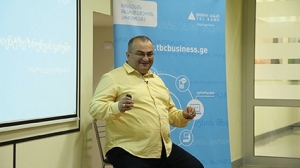“Give Us Five Years” - Exclusive Interview with the New Minister of Education
He would be the first to admit that, unlike his predecessors, he lacks in political experience. What he intends to compensate this lack with lies in his impressive skills in management – both practically and theoretically. Why did one of Georgia’s most prominent management gurus agree to become the Minister of Education and Science? How does he plan to improve the motivation of teachers and reinforce the stale state education system? These were the questions Palitra’s Rusa Shelia put to Minister Alexander Jejelava.
“It didn’t come as a surprise to me,” he admitted of the request for him to take on the post of Minister, reminiscing that he had received similar offers throughout the tenures of the last three (!) governments. Apparently, it was the personal connection with Prime Minister Kvirikashvili that tipped the scales this time round. His friends also weighed in, telling him that this was the time to actually change things and if he were to refuse, the momentum might be lost. But unlike most Georgian ministers, he doesn’t see himself as a long term statesman figure. He says he has come to change things “For real”.
However, the four months that are left until the parliamentary elections in Georgia is hardly sufficient time for any telling changes, so it is safe to assume that he will keep his post a while longer, provided Georgian Dream win the elections, of course.
“If not, I’ll just go back to what I used to do. I’m not a career politician and don’t plan to become one,” Jejelava reaffirms, adding that he sees the aforementioned four month period as a time to test the waters and see how the government will react to his methods. “My pledge is a simple one,” he says. “I, together with my team, want to change things for the better and solve problems inherent in the current education system. If we’re allowed to do that, then it’s worthwhile, otherwise I don’t fancy being a mere cosmetic addition to the ministry.”
For many, the first real test to determine whether his position has any cosmetic value will come in the form of the elections of the rector of Tbilisi State University, due to commence in August. The country’s largest education center has been beset with waves of student protests, the youth apparently dissatisfied with how the incumbent administration is handling matters. More protests are expected and the role of the Minister as a mediator between confronting sides is not to be underestimated.
“I’ve already held ten meetings with students and am doing my best to get all sides to engage in a dialogue. We Georgians are temperamental people and one could even say anger and discontent is in our style,” the minister admits, conceding that there is a portion among students on both sides who might be politically motivated. Which he apparently doesn’t view as an inherently bad thing, stressing that “it’s even positive unless it grows into violence and offending one another.”
Yet another problem that is going to keep the newly appointed minister pensive for the foreseeable future is the sharp increase in the numbers of youth that could not pass the National Exams. The exact numbers have yet to be revealed by the Ministry, while it has become public knowledge that about 86 percent of teachers couldn’t pass the mandatory qualification exams. Being no stranger to the education system, these numbers have not come as a surprise for Jejelava, who believes that the modern education structure is outdated in practically every component. The culprit? The previous government, apparently.
“It’s rather telling that the United National Movement is rather vocal about the distressing results of the National Exams – to me it means nothing but that they admit that wrong decisions have been made in the system years ago and now we have to witness the results of those mistakes. When your way of dealing with school and teachers is to oppress them and you implement the methodology of ruthlessness and cruelty, lack of motivation is bound to happen, which at the end is reflected in the pupils’ performance. Rest assured, we’ll make all numbers public – that’s the first step towards correcting the situation, identifying the problem,” Minister Jejelava says.
“Give us five years and we will deliver some outstanding results,” he pledges, explaining that his preferred method to remedy the situation is a combined effort on raising the motivation of the teaching personnel while at the same time giving the students/pupils more time and freedom to develop themselves and explore the fields they are really keen on.
“We’ve been basically stoning the teachers for 25 years, only remembering them when we needed to find a scapegoat for a failed exam,” Jejelava says. What he intends to do is to make the profession of teacher an appreciated one and apparently that doesn’t necessarily mean financial encouragement. “I’d advise everyone who thinks that the only secret to motivation lies in money- you’ve got to throw those age-old management manuals out the window!” he says in a tone that excludes every possibility of things being any other way. He goes on to emphasize that teaching should be a matter of social pride. “We have come to associate words like Coca Cola and iPhone with a positive meaning, and being a teacher will need to have the same positive ring to it,” he says.
The new minister also commented on the German model of education which was recently advocated by the Prime Minister – an approach which ensures that the student gets employed at the earlier stages of university studies and can simultaneously work and study, though not at the expense of one or another. It remains to be seen how this model will be effective in a country where even dedicated professionals have trouble finding steady employment, but the Minister is convinced this is due to structural unemployment, where one’s professional competence, however high it might be, fails to correspond to the demands of the labor market.
“Today you’ll have no trouble finding work as an accountant, or a crane operator, or an engine specialist, but you’ll most probably struggle if you are the 220th best lawyer in your capacity. On the other hand, we have just a single biochemicals expert in the country and whoever becomes good at it will inevitably be employed,” Jejelava explained, adding that even those who missed their first shot due to a wrongly chosen profession or high competition in a given field will be given another chance, another shot at “something else,” through retraining. “Everyone deserves and will be given the opportunity to renew or reestablish their career,” he said, ending the interview on a hopeful note.
Rusa Shelia












